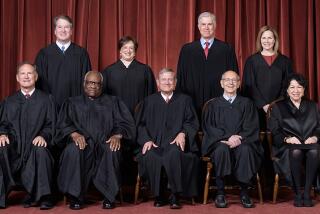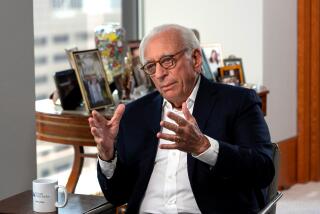Sizing Up the Democratic Contenders’ Strengths
He fought Ronald Reagan over Nicaragua and missile defense programs. He fought for more cops on the street, cleaner air and protecting the Alaska wilderness.
To hear John F. Kerry tell it as he runs for the Democratic presidential nomination, he has been in the vanguard of dozens of legislative and policy battles during his almost 20 years as a senator from Massachusetts.
While a review of his record shows he has a rightful claim to leadership in many of these areas, it also finds that in some cases he exaggerates his role.
When Kerry told a town hall meeting in Ohio on Tuesday that “I led the fight to stop the drilling in the Arctic [National] Wildlife Refuge,” he was on solid ground. A longtime environmentalist, he was a leader in the filibuster that successfully blocked President Bush’s initiative to expand oil drilling in Alaska’s backcountry.
But last month, when he told a campaign rally in Iowa that “I led the fight to stop Ronald Reagan’s illegal, clandestine war in Central America,” he was on shakier footing. Asked who headed that effort in the mid- to late 1980s, analysts are more likely to name other lawmakers, such as then-House Speaker Jim Wright (D-Texas), then-Rep. David E. Bonior (D-Mich.) and Sen. Christopher Dodd (D-Conn.).
Kerry has littered his campaign speeches with allusions to how he “led the fight” on more than a score of issues. But among his colleagues, he is identified with a more limited range of accomplishment, including his drive to normalize U.S. relations with Vietnam and his 1992 investigation of corruption by the Bank of Credit and Commerce International.
“You see the more exaggerated claims in the areas where [Kerry] doesn’t have that strong a record,” said Louis DiNatale, senior fellow at the University of Massachusetts at Boston.
Kerry hasn’t broken into the ranks of lawmakers whose names become synonymous with major issues or programs, such as the McCain-Feingold campaign finance law, named for Sens. John McCain (R-Ariz.) and Russell Feingold (D-Wis.) or Roth IRAs, created by former Sen. William V. Roth Jr.
Kerry’s legislative output has been limited in part because he has focused on foreign policy and investigations, rather than domestic issues that tend to produce more legislation. In addition, Republicans have controlled Congress or the White House or both for all but two of Kerry’s years in the Senate, hampering his opportunities to push legislation into law.
When pressed about a speech filled with claims of “I led the fight,” Kerry spokesman David Wade argues that the senator “was out there when other people weren’t willing to be,” and that he “had great partners in some of these efforts.”
“At pivotal moments, he was the person who was willing to step up to the plate, join the fight,” Wade said. “And it tells you something about character.... It tells you something about the kind of president he would be.”
As he heads into Super Tuesday’s 10 contests, including the California primary, the major yardstick by which Kerry can be measured is his Senate record.
That record has become a target. Sen. John Edwards of North Carolina, Kerry’s major rival in the Democratic race, has attacked his votes on trade agreements. Republican Party Chairman Ed Gillespie on Wednesday continued GOP efforts to spotlight Kerry votes to reduce defense spending and cancel weapons systems.
“These votes demonstrate a lack of judgment when it comes to national security,” Gillespie said.
Here is a look at several of the claims Kerry has made on the campaign trail and how his deeds measure up to his words:
“As senator I stood up and I led the fight to stop Ronald Reagan’s illegal, clandestine, unconstitutional war in Central America.... And I led the fight, I stood up to powerful forces and exposed what Oliver North was doing in his private aid network.” -- Jan. 14, Davenport, Iowa.
Kerry was active, from his earliest days in the Senate, in the debate over President Reagan’s efforts to support the anti-Sandinista rebels, known as Contras, in Nicaragua in the 1980s. But other lawmakers are generally credited with playing a larger role than he did.
“Sen. Kerry was certainly involved,” said Edith Wilkie, former executive director of the Congressional Arms Control and Foreign Policy Caucus and an opponent of Reagan’s policy. “He found his niche and did his thing, and it was a good contribution. But he didn’t single-handedly gather the votes” to block Reagan’s Contras policy.
Wright, for instance, worked with the Reagan administration to foster negotiations that led to a peace agreement in the region.
Kerry conducted an investigation in 1985-86 into allegations of drug smuggling, gunrunning and other corruption by Contra leaders and their U.S. supporters. But he never publicly named Oliver North as part of that operation, although he had suspicions about the White House aide who was later found to be central to efforts to channel support to the Contras.
North’s role was questioned by both the House and Senate intelligence committees, which peppered the White House with questions about him in the summer of 1985. That September, then-Sen. David Durenberger (R-Minn.) and then-Reps. Lee Hamilton (D-Ind.) and George Brown (D-Riverside) all said publicly that North was the key go-between for the Contras.
Not until a year later, on Oct. 10, 1986, did Kerry publicly name North as part of the network.
Jonathan M. Winer, Kerry’s counsel at the time, said the senator was the first to make the allegations against North with sufficient evidence to back up his charge. Before then, Winer said, such allegations had been denied by North and the Reagan White House, and Washington’s “official reality” was that North was simply monitoring the Contras.
“I led the fight to put 100,000 cops on the street in 1994.” -- Jan. 30, Wilmington, Del.
Kerry was very involved in shaping the 1994 anti-crime bill that included a Clinton administration initiative to help localities hire 100,000 more police officers. But Sen. Joseph R. Biden Jr. (D-Del.) is widely regarded as the driving force behind the bill.
“Sen. Biden was the chief architect,” said Chip Unruh, a Biden spokesman. “Kerry was an important ally.”
Kerry worked behind the scenes to boost funding in the measure, urging Clinton to push for the 100,000 officers he had promised in his presidential campaign, not the 50,000 he included in his first budget plan.
Bruce Reed, a top Clinton aide at the time, said it was “extraordinarily useful ... to have a Democratic member of Congress knocking on our door telling us not to back down from a campaign promise.”
When pressed by reporters at a campaign stop in Wilmington about the issue, Kerry acknowledged that although he helped push the measure through the Senate, Biden “subsequently carried it through Congress, and he deserves credit.”
“I’ve been a leader ... on arms control issues, the MX missile, the antisatellite weaponry and the ‘Star Wars’ program.” -- Jan. 30, Wilmington, Del.
Kerry offered many amendments to curb funding for the missile defense initiative proposed by Reagan that was known as Star Wars, and for antisatellite weapons programs. But most of those issues have faded from prominence, as Democrats have backed away from confronting Republicans on the need for such missile defense systems.
“Democrats have largely ducked,” said John Isaacs, head of the Council for a Livable World, an arms control group. “That includes all of them that have been active in the past. Kerry was active.”
Democrats had planned to confront Bush on his plans to develop a missile defense program akin to Star Wars after he campaigned on the issue in 2000. But they decided not to oppose the program after the Sept. 11 terrorist attacks. Research is proceeding and the Pentagon hopes the system will start operating in Alaska in September.
“I led the fight to stop the drilling in the Arctic [National] Wildlife Refuge.” Feb. 24, Struthers, Ohio.
Kerry was not alone in threatening to filibuster any bill that included an expansion of drilling in the refuge, but his staff and environmental activists say he was the first to make that threat.
He earns high marks from environmentalists for his leadership on that and other issues, like his long-standing effort to require stricter fuel economy standards for vehicles. Kerry says the higher standards would improve air quality and lessen U.S. dependence on foreign oil. But Republicans have teamed with Democrats from auto-producing states to block the initiative.
“I went to Cambodia and personally negotiated the tribunals with the U.N. that are going to take place at the site of the ‘Killing Fields’ and hold [the Khmer Rouge] accountable.” Feb. 5, Portland, Maine.
From 1975 to 1979, the Khmer Rouge killed more than a million Cambodians in the aftermath of the war in Vietnam. As leaders of that guerrilla movement age and die, there is increasing urgency to bring them to justice, and the United Nations has been pushing for tribunals to hold war criminals responsible.
Kerry traveled to Cambodia twice and to Cuba once in 2000 to meet with Cambodian leaders who included Prime Minister Hun Sen, himself a former Khmer Rouge official, to discuss the makeup of proposed tribunals. Efforts by the U.N. had stalled; the international body did not want the Cambodian government to be in charge of the process.
Kerry brokered a compromise that would include some Cambodian involvement. Opinion is mixed on the deal. Some officials believe Kerry gave too much ground to the Cambodians in reaching the agreement. Others think he crafted an agreement that will help bring justice to Khmer Rouge victims.
Fiona McKay, director of the International Justice Program for Human Rights First, is among those wary of the compromise. But she also praises Kerry’s efforts.
“He visited Cambodia and met with leaders there, and he helped resolve a deadlock that had been reached over the terms of this tribunal,” she said.
Times staff writers Doyle McManus in Washington and Maggie Farley in New York contributed to this report.
More to Read
Get the L.A. Times Politics newsletter
Deeply reported insights into legislation, politics and policy from Sacramento, Washington and beyond. In your inbox three times per week.
You may occasionally receive promotional content from the Los Angeles Times.








